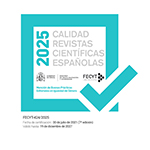L’Apocalypse selon Jean Giono: du "Grand Troupeau" au "Grand Théâtre"
Resumen
Dans cet article nous chercherons à comprendre quel était pour Jean Giono le véritable sens de l’Apocalypse depuis l’analyse d’un de ses premiers romans Le Grand Troupeau jusqu’à l’un de ses textes les plus récents et pourtant moins connu, Le Grand Théâtre; texte qui, par ailleurs, répond à une commande de Joseph Foret en vue de la publication d’une édition de prestige de l’Apocalypse de Saint Jean. Nous verrons comment Jean Giono nous présente sa vision particulière de l’Apocalypse du Grand Troupeau au Grand Théâtre, faisant de l’homme et de son destin le centre de sa recherche et de sa réflexion. Tout au long de notre étude nous ne manquerons pas de souligner l’importance de la figure paternelle dans la réflexion gionesque, figure omniprésente dans Le Grand Théâtre et porteuse de la connaissance du texte biblique.
Abstract
In this article we focus on what Apocalypse meant for Jean Giono through the analysisof To The Slaughterhouse, one of his earlier novels, and of one of his most recent texts – yet less renowned –, Le Grand Théâtre, a work commissioned by Joseph Foret to beincluded in the release of an edition of prestige of the Apocalypse of St. John. We’ll seehow Jean Giono presents his personal vision of the Apocalypse from To The Slaughterhouse to Le Grand Théâtre, considering man and his destiny as the centre ofhis research and reflection. Throughout our study we will not fail to emphasize on themeaning of the father figure in the gionesque thinking, omnipresent in Le Grand Théâtre and the bearer of the knowledge of the biblical text.
Descargas
Descarga artículo
Licencia
La revista Amaltea. Revista de mitocrítica, para fomentar el intercambio global del conocimiento, facilita el acceso sin restricciones a sus contenidos desde el momento de su publicación en la presente edición electrónica, y por eso es una revista de acceso abierto. Los originales publicados en esta revista son propiedad de la Universidad Complutense de Madrid y es obligatorio citar su procedencia en cualquier reproducción total o parcial. Todos los contenidos se distribuyen bajo una licencia de uso y distribución Creative Commons Reconocimiento 4.0 (CC BY 4.0). Esta circunstancia ha de hacerse constar expresamente de esta forma cuando sea necesario. Puede consultar la versión informativa y el texto legal de la licencia.
La revista Amaltea. Revista de mitocrítica no cobra por tasas por envío de trabajos, ni tampoco cuotas por la publicación de sus artículos.














